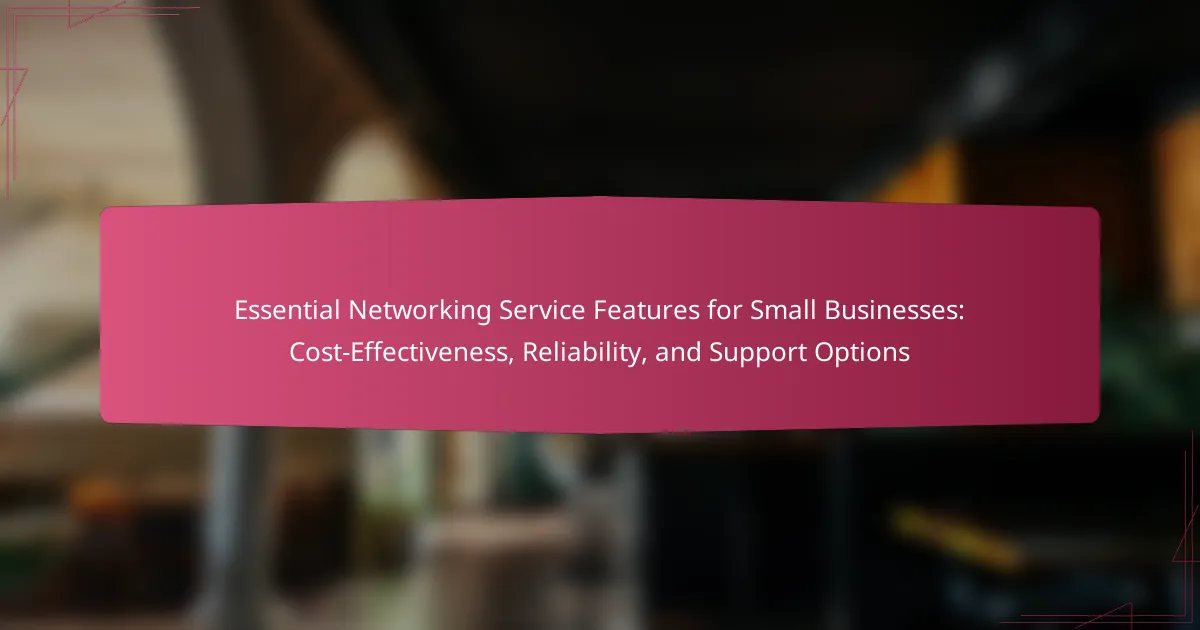
What are the essential networking service features for small businesses?
Essential networking service features for small businesses include cost-effectiveness, reliability, and strong support options. Cost-effectiveness ensures that small businesses can afford the necessary services without overspending. Reliability is crucial for maintaining consistent operations and minimizing downtime. Strong support options provide assistance when issues arise, ensuring quick resolutions. These features collectively enhance business productivity and operational efficiency. According to a survey by the Small Business Administration, reliable networking services can improve overall business performance by up to 30%.
How does cost-effectiveness impact small business networking services?
Cost-effectiveness significantly influences small business networking services by determining affordability and service quality. Small businesses often operate with limited budgets. Cost-effective networking solutions allow them to access essential services without overspending. This enables better allocation of resources towards growth and development. According to a survey by the National Small Business Association, 67% of small businesses prioritize cost when choosing service providers. Additionally, cost-effective services can lead to increased competition among providers. This competition often results in improved service offerings and innovation. Ultimately, cost-effectiveness ensures that small businesses can maintain reliable networking services while managing their financial constraints.
What factors contribute to the cost-effectiveness of networking services?
Cost-effectiveness of networking services is influenced by several key factors. First, economies of scale play a significant role. Larger service providers can spread costs over a larger customer base, reducing per-user expenses. Second, the use of cloud-based services often lowers infrastructure costs. Businesses can avoid heavy upfront investments in hardware. Third, competitive pricing among service providers drives down costs. This competition encourages providers to offer better rates and packages. Fourth, efficient network management reduces operational costs. Automated systems can minimize the need for extensive IT support. Lastly, bundled services offer savings. Providers often discount packages that include multiple services, enhancing overall value.
How can small businesses assess the cost-effectiveness of different networking options?
Small businesses can assess the cost-effectiveness of different networking options by analyzing total costs versus benefits. They should calculate initial setup costs, ongoing maintenance expenses, and potential downtime costs. Evaluating these factors helps in understanding the financial impact. Comparing performance metrics, such as speed and reliability, is also essential. Metrics like uptime percentage and user satisfaction can indicate overall effectiveness. Additionally, small businesses can consider scalability and future needs. Research indicates that businesses often overlook long-term costs, which can significantly affect budget planning. Analyzing these aspects ensures informed decisions on networking options.
Why is reliability crucial for networking services in small businesses?
Reliability is crucial for networking services in small businesses because it ensures consistent access to critical resources. Small businesses often rely on networking services for daily operations. Unreliable networks can lead to downtime, which directly impacts productivity and revenue. According to a report by the Uptime Institute, downtime can cost small businesses an average of $5,600 per minute. Reliable networking services also enhance customer satisfaction by maintaining communication channels. Additionally, dependable networks support data security, reducing the risk of breaches. In a competitive market, reliability can be a key differentiator for small businesses.
What are the key indicators of reliability in networking services?
Key indicators of reliability in networking services include uptime, latency, and support responsiveness. Uptime refers to the percentage of time the service is operational. A reliable service typically boasts an uptime of 99.9% or higher. Latency measures the time it takes for data to travel across the network. Lower latency is indicative of a more reliable service. Support responsiveness assesses how quickly a provider addresses issues. Quick response times enhance overall reliability. Additionally, redundancy in network infrastructure contributes to reliability by providing backup in case of failures. Regular performance monitoring further ensures consistent reliability.
How can small businesses ensure they choose reliable networking service providers?
Small businesses can ensure they choose reliable networking service providers by evaluating their track record and client reviews. Researching the provider’s history reveals their experience and reliability. Checking customer testimonials provides insights into service quality. Additionally, assessing the provider’s technical support options is crucial. Reliable providers offer 24/7 support and quick response times. Examining service level agreements (SLAs) helps confirm their commitment to uptime and performance. Comparing pricing structures ensures services fit within budget constraints. Finally, seeking recommendations from other businesses can lead to trustworthy options. These steps help small businesses make informed decisions when selecting networking service providers.
What support options should small businesses consider in networking services?
Small businesses should consider various support options in networking services. These options include technical support, managed services, and customer service. Technical support provides assistance with troubleshooting and resolving network issues. Managed services offer proactive monitoring and maintenance of network infrastructure. Customer service ensures that businesses receive timely responses to inquiries and concerns. Additionally, small businesses should evaluate the availability of 24/7 support. This ensures help is accessible during critical times. Choosing providers with good reputations for support can enhance overall network reliability. According to a survey by Spiceworks, 62% of small businesses prioritize support when selecting networking solutions.
What types of support options are typically available for networking services?
Networking services typically offer a range of support options. These options include technical support, which assists with troubleshooting and resolving issues. Customer service support provides general assistance and information about services. Managed services offer proactive monitoring and maintenance of network systems. Remote support allows technicians to access systems from a distance for quick fixes. On-site support involves technicians visiting the business location for hands-on assistance. Documentation and knowledge base resources provide self-service options for users. Additionally, training sessions can help staff understand and utilize networking services effectively. These support options ensure businesses can maintain reliable network operations.
How do support options affect the overall performance of networking services?
Support options significantly influence the overall performance of networking services. Effective support options ensure rapid issue resolution, minimizing downtime. Quick responses to technical problems enhance service reliability. Regular maintenance and updates from support teams optimize network performance. Additionally, comprehensive support can lead to better user satisfaction. Satisfied users are more likely to utilize services efficiently. A study by Forrester Research found that businesses with robust support systems experience 30% less downtime. This directly correlates to improved productivity and operational efficiency. Therefore, strong support options are crucial for maximizing networking service performance.
How do cost-effectiveness, reliability, and support options interrelate?
Cost-effectiveness, reliability, and support options are interconnected elements in networking services. Cost-effectiveness measures the value received relative to the investment made. Reliability ensures that services function consistently without failure. Support options provide assistance when issues arise, enhancing the overall service experience.
When a service is cost-effective, it often allows for more resources to be allocated to enhancing reliability and support. Reliable services reduce downtime, which can lead to cost savings. Conversely, high support options can improve reliability by addressing problems quickly, thus maintaining performance.
Research indicates that businesses prioritizing these three aspects see improved operational efficiency. A study by Gartner found that 70% of small businesses consider reliability a key factor in selecting networking services. This highlights the importance of these interrelationships in making informed decisions.
What are the potential challenges small businesses face when selecting networking services?
Small businesses face several challenges when selecting networking services. One major challenge is cost-effectiveness. Many small businesses operate on tight budgets, making it crucial to find affordable solutions without sacrificing quality. Another challenge is reliability. Small businesses require consistent network performance to ensure smooth operations, and unreliable services can lead to downtime. Support options also pose a challenge. Limited technical expertise within small businesses can make it difficult to address networking issues effectively. Additionally, scalability is a concern. As small businesses grow, their networking needs may change, necessitating flexible solutions. Lastly, security is a significant challenge. Small businesses must protect sensitive data, and inadequate networking services can expose them to cyber threats.
What best practices should small businesses follow when choosing networking services?
Small businesses should prioritize cost-effectiveness, reliability, and support when choosing networking services. Cost-effectiveness ensures that the service fits within the budget while providing necessary features. Reliability is crucial for maintaining uninterrupted business operations. Support options should include accessible customer service and technical assistance. Research shows that 70% of small businesses value reliable service over low cost. Choosing a provider with a proven track record enhances business continuity. Additionally, evaluating user reviews can provide insight into service quality.
How can small businesses evaluate their specific networking needs?
Small businesses can evaluate their specific networking needs by assessing their operational requirements. They should identify the number of devices that will connect to the network. Understanding the types of applications used is also crucial. Analyzing current bandwidth usage helps in determining necessary capacity. Businesses should consider future growth and scalability needs. Evaluating security requirements is essential to protect sensitive data. Gathering feedback from employees on network performance can provide insights. Finally, consulting with IT professionals can guide in making informed decisions.
What common mistakes should small businesses avoid in networking service selection?
Small businesses should avoid several common mistakes in networking service selection. One mistake is not assessing their specific needs. Each business has unique requirements based on size and operations. Ignoring this can lead to choosing an inadequate service.
Another mistake is overlooking scalability. Businesses often underestimate future growth. A service that cannot scale may require replacement sooner than expected.
Additionally, many businesses fail to evaluate service reliability. Downtime can directly impact productivity and revenue. Choosing a service with a proven track record is crucial.
Cost is also a common pitfall. Selecting the cheapest option may compromise quality. Small businesses should balance cost with features and support.
Finally, neglecting customer support is a significant error. Responsive support can resolve issues quickly. Businesses should prioritize services with strong customer support.
Essential networking service features for small businesses include cost-effectiveness, reliability, and strong support options. Cost-effectiveness allows small businesses to access necessary services within budget constraints, while reliability ensures consistent operations and minimizes downtime, which can significantly affect productivity and revenue. Strong support options provide timely assistance, enhancing overall network performance. This article will explore how these features interrelate, the factors contributing to their effectiveness, and best practices for small businesses when selecting networking services. Additionally, it will address common challenges and mistakes that small businesses face in this process.




